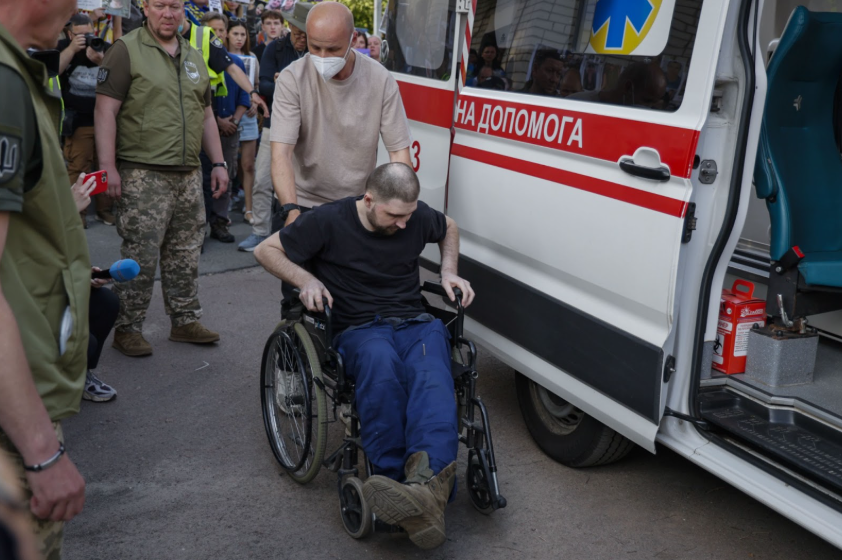Ukrainian defenders return from captivity without limbs and in critical condition: coach tells how to recover through sports
23 June 13:24
The exchange, which should have been a cause for celebration, became a painful testament to the cruelty with which Russia treats Ukrainian prisoners. On Saturday, June 14, another group of released soldiers returned to Ukraine. But the footage of the reunion is not only about heroism, but also about disaster. Many of those who survived captivity return without limbs, with amputations, in wheelchairs, with their health completely destroyed.
Andriy Yusov, a representative of the GUR, said that many of the released prisoners were immediately transported in ambulances upon arrival – they could not even stand. People with infections, lost vision, open wounds and chronic complications. Long-term treatment and rehabilitation are ahead.
Free rehabilitation for veterans: what services are available and how to get them
Veterans are entitled to free rehabilitation in medical institutions contracted by the National Health Service. These institutions employ specialists who use only evidence-based, modern methods of rehabilitation. What services are available for free:
- Rehabilitation examination and preparation of an individual therapy plan
- Neurorehabilitation, orthopedic, cardiorespiratory rehabilitation
- Physical therapy, ergotherapy, speech therapy, psychological assistance
- Anesthesia in a hospital setting
- Support from orthotists, psychotherapists and other specialists
Separate rehabilitation is provided in the aftercare package:
– Surgical interventions
– heart attack or stroke
– treatment of oncological diseases.
To undergo rehabilitation, you need to have a referral from your family doctor or attending physician. After that, a veteran can apply to any institution that has a contract with the NHSU for one of the rehabilitation packages:
- “Rehabilitation care for adults and children in inpatient settings”
- “Rehabilitation care for adults and children in outpatient settings”
SUP therapy and strongmen: veteran training that changes lives
Sport as a way to return to civilian life – this is the goal of Serhiy Pivko, head of the Kyiv Rowing Center NGO, an adaptive trainer and specialist in strength and compensation training, when training war veterans. In an exclusive commentary for "Komersant Ukrainian", he explained how physical activity can help restore not only the body but also the mind, establish social connections and regain control over one’s life.
“We train the military together with the Strongman Federation of Ukraine. One of our areas is training on SUPs (stand-up paddleboards), which are available to everyone. Every Tuesday and Friday, anyone can come and try to go out on the water,” says Pivko.
Serhiy and his team conduct training not only in sports clubs, but also visit hospitals. According to him, the most difficult thing is to find veterans who are willing to come, because after the frontline, sport is not always the first thing a person thinks about.
“For example, we were in Titan, for example. But in general, it is difficult to find military men. And it’s understandable – they often have no time for that. But physical activity is a powerful tool for resocialization. Sport helps to get back into the rhythm of life, to connect a person with the environment, to create a feeling that he or she is not alone,” says Serhiy Pivko.
The coach emphasizes that training is free for military personnel and veterans. However, it is necessary to work with such people very carefully: adaptive sports takes into account physical capabilities after injuries, so it is important not to harm them.
“The main thing is that the military and veterans come. When a community is formed, they begin to communicate with each other, and this helps a lot. And then there is the training process, where exercises are adapted to each individual,” he notes.
Sport as a place of remembrance and unity. The Unity Sup Cup in Memory of Kyrylo Shmetan, a sports and recreational event organized with the support of the Kyiv City Department of Youth and Sports, has also recently taken place. It was attended by children aged 6 to 18, including children with disabilities.
“This is an example of how sports can unite different generations, with different experiences and different physical abilities. Such events are important for both veterans and the community as a whole,” summarized Pivko.
So, sport is not only about physical strength. It is about trust, acceptance, and a new beginning. And a chance that every veteran should get.









